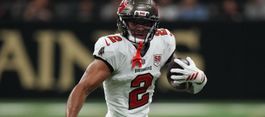There I was at 10:30pm on a Tuesday night in October arguing with my sister over the phone about whether we should trade Eric Decker and San Diego’s Ladarius Green. I had Green, who had just come off his third double-digit game in four weeks. She had Decker, who had not yet peaked like he would in the remainder of the season. As these things go, the argument wandered between the value of the players themselves, whether it was OK to change your mind after you offer the trade but before the other person accepts it, and some old fights from our childhood for good measure.
Maybe there’s not much you can do to avoid yelling at your brother during a trade. But for everyone else, use these 10 rules to successfully (and peacefully) make your next trade.
Import your team for free to get waiver wire advice ![]()
1. Identify your needs. If it is still early in the season, your primary concern should be depth. You don’t know which one yet, but at least one of your shiny “set and forget” starters will be a disappointment and you’ll need someone reliable on your bench when that happens. For that same reason, don’t try trading for top-ranked players until at least Week 3 or 4. Before you do something big, you might as well get some more information about the top players on other teams and the lottery ticket players on yours. Perhaps you’re deeper at RB than you thought in Week 1.
If it’s late in the season, you should start thinking about one solid starting lineup as you head toward the playoffs.
2. Find the right trade partner, not just the right player. Let’s say your problem is that you have two top-20 RBs sitting on your bench but you are stuck starting Jordan Cameron at TE every week. Don’t automatically get on the phone with the Rob Gronkowski owner. You want to look for someone with poor RBs and two startable TEs. If a trade addresses your trade partner’s needs as well, it has a much better chance of being accepted.
3. Trading is a negotiation. If you send a trade, don’t start with your absolutely best offer, but do start with something reasonable. If you can, give them a couple of options. Letting the other person make a choice about who they get makes them feel in control and increases your chances of getting a deal done.
If you receive a trade, respond in a timely manner. If you don’t like the offer, either politely decline or make a counteroffer. Berating their trade offer just makes them less likely to trade with you in the future. Also, remember that this might not be their best offer. See who else they’d be willing to give up.
4. Sell the trade. When you send a trade, you have the opportunity to tell your trade partner why you think this is a good trade for him/her. Don’t focus on player evaluation unless there’s some new piece of information they may not yet know. That comes off as pretentious. Instead, tell them why you chose their team for this trade. How does the trade make their team better?
5. You *don’t* have to win the trade; you just have to improve your team. Some owners would rather lose every week than feel like they didn’t get equal value for their player. Look at how many points your team will likely score without the trade and then how many they will score with it (adjusting for things like injury risk). Choose the better option. Everything else is just ego.
6. Value changes week to week. This is your reminder that trading players is very similar to buying and selling stocks. Ideally, you want to trade away a player after he has a bunch of big games, but before he sees a downturn in production. This is his peak value. You want to trade for a player who has been mediocre, but whose changing situation suggests an increase in scoring.
Remember that the top-scoring players from Weeks 1-8 and the top-scoring players from Weeks 9-17 are most often different. Always evaluate how a player will likely do after you trade for him. You don’t get any points for last week’s TDs.
7. Be ethical. If you read on Fantasy Pros that Jerrick McKinnon is going to start getting more carries than Adrian Peterson, it is absolutely fair for you to try to trade AP for someone that doesn’t read the latest news. If AP got a high ankle sprain in practice and will miss five weeks, don’t try to trade him before the news spreads to ESPN or Yahoo. Sure, you are within your rights to do it, but is it worth having that reputation with your league? Remember, you want to be able to trade again in the future.
Another ethical point: A contract isn’t official until everyone signs it. In the same way, a trade isn’t official until it is offered and accepted on the league website. Having said that, it is very frustrating to have a trade accepted via text or email, then rejected on the site. If you are unsure, say you’re unsure until you’re ready to accept it online. If you thought you were sure, but then had a change of heart, you are free to reject the trade online, but beware that this could hurt your ability to trade in the future.
8. After Week 4, bye weeks affect value. If you are trading for a player that has not had his bye yet and your player has, that increases the value of your player.
9. Keeper league? Trade for this season until right before the deadline. August 2017 is a very long time away. You have no idea who’s going to get injured, traded, have a bad season, lose their job, or who you might pick up off the waiver wire that you’ll want to keep. You should absolutely give younger players a little value bump in keeper leagues just in case. Outside of that, focus on winning this year.
10. Don’t Veto! This isn’t technically trading advice, but probably the most important trading issue. The two most common reasons for a veto? 1) They make one team too good. 2) You don’t think the trade is even. Neither of these is an appropriate reason for a veto. It is not your job to evaluate players on behalf of another team. It’s definitely not your job to use the veto as a weapon against a good team. Vetoes are there to prevent cheating. Period.
Subscribe: iTunes | Stitcher | SoundCloud | Google Play | TuneIn | RSS
Brian Hoffman is a correspondent at FantasyPros. To read more from Brian, check out his archive and follow him @hoffmaba1.









